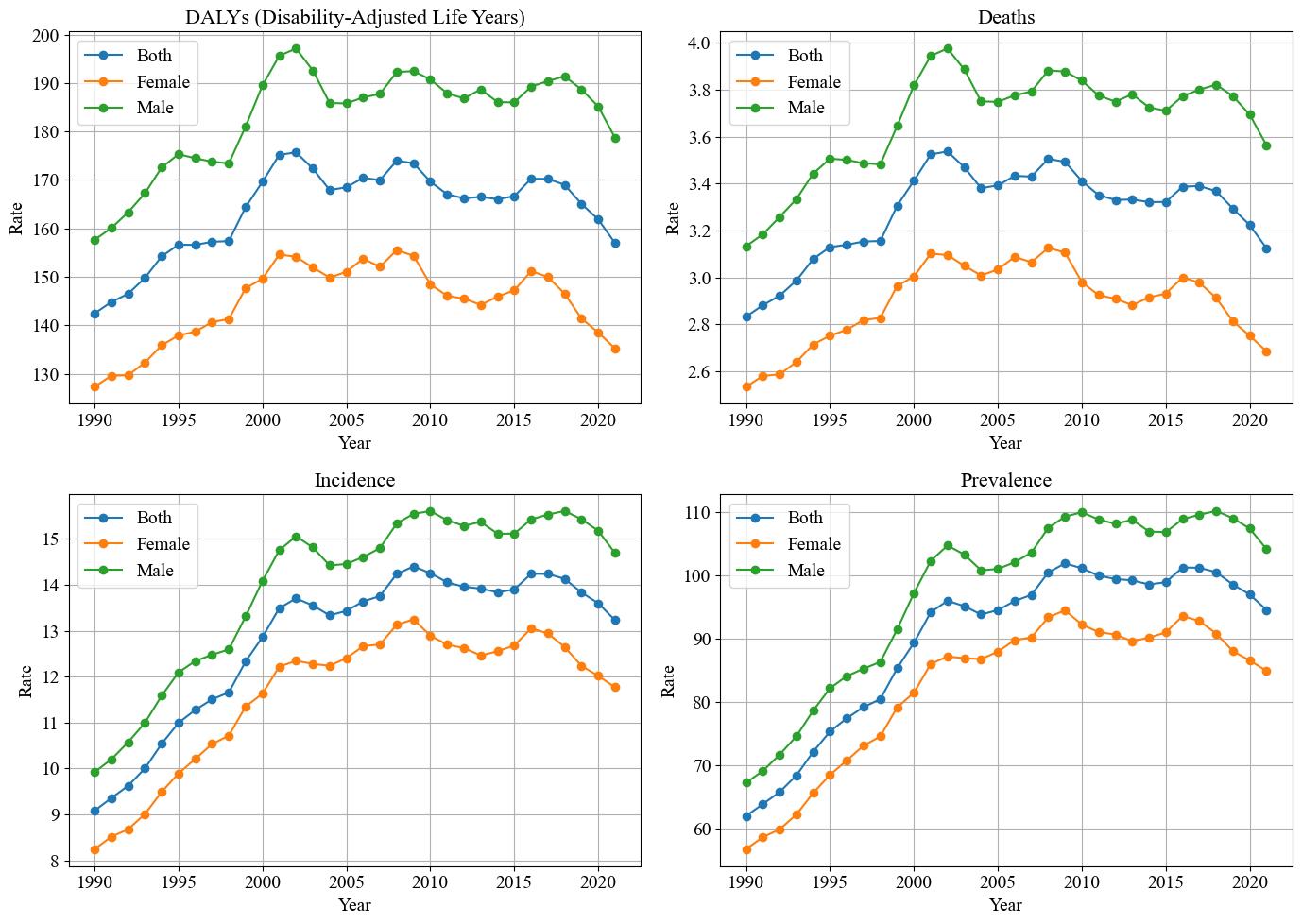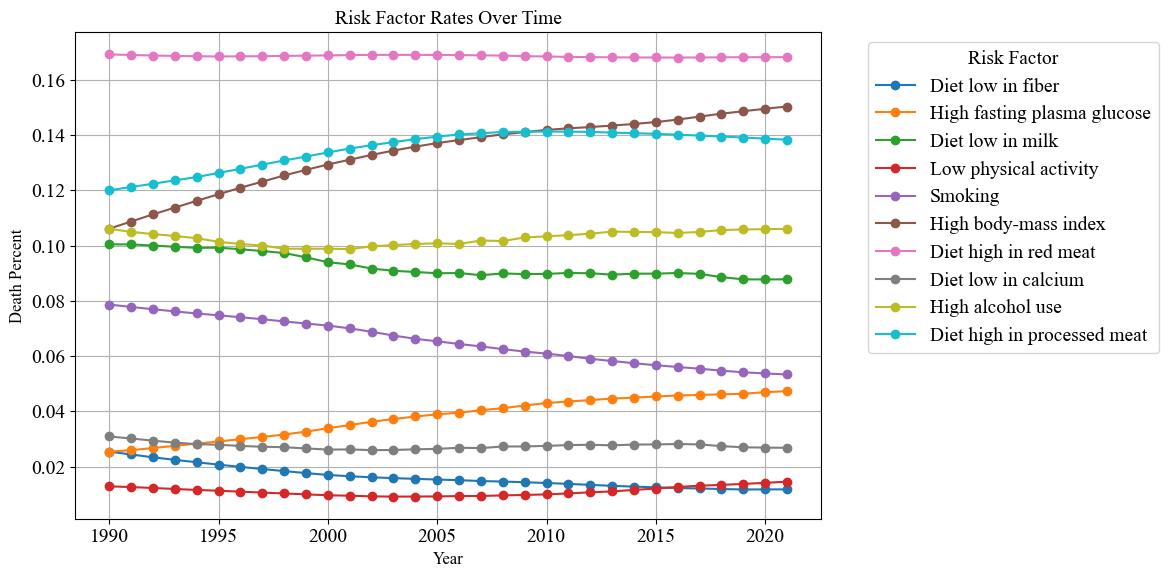Tuesday Poster Session
Category: Colon
P4559 - Rising Early-Onset Colorectal Cancer in the US (Ages 20-49): The Role of Diet and Metabolic Risk Factors
Tuesday, October 28, 2025
10:30 AM - 4:00 PM PDT
Location: Exhibit Hall

Mohammed Y. Youssef, MD
Hunt Regional Medical Center
Greenville, TX
Presenting Author(s)
Mohammed Y. Youssef, MD1, Mohamad Elgozair, MD2, Ahmed Abdaltawab, MD3, Sara A. Ali, MD4, Mohamed A. B. Elnaggar, MD5, Mostafa Eysha, MD6, Mona A. Ali, MD7, Sherif E. Elhanafi, MD8
1Hunt Regional Medical Center, Greenville, TX; 2Danbury / Yale New Haven Hospital, Danbury, CT; 3University of Pittsburgh Medical Center, Pittsburgh, PA; 4Mansoura university, Mansoura, Ad Daqahliyah, Egypt; 5Hartford Healthcare, Hartford, CT; 6Texas tech University health science center El Paso, El Paso, TX; 7Mansoura University, Mansoura, Ad Daqahliyah, Egypt; 8Texas Tech University Health Sciences Center, El Paso, TX
Introduction: Early onset colorectal cancer (EOCRC), defined as the colorectal cancer diagnosed in young adults aged 20–49 years, remains a growing public health challenge, with increasing incidence among younger populations. In this study, we evaluate the U.S trends in EOCRC among individuals aged 20-49 years from 1990 to 2021, Additionally, we explore the temporal contribution of dietary and metabolic risk factors to CRC-related mortality.
Methods: The U.S specific data for the age group between 20-49 were extracted from the Global Burden of Disease (GBD) study for the years 1990 to 2021. Primary outcomes included incidence, mortality, prevalence, and disability-adjusted life years (DALYs) per 100,000 population. Data were stratified by sex, and trends in modifiable risk factors contributing to EOCRC-related deaths were examined.
Results: The age-specific incidence of colorectal cancer increased from 9.08 to 13.23 per 100,000 in 1990 and 2021 respectively. Males had higher incidence rates than females (1990: 9.92 vs 8.24; 2021: 14.69 vs 11.77 per 100,000, respectively).
The age specific prevalence rate increased from 61.99 in 1990 to 94.54 per 100,000 in 2021.
The overall EOCRC related death rates increased from 2.83 to 3.12 per 100,000 between 1990 and 2021, with males showing higher rates than females (3.56 vs 2.68 in 2021). DALYs rates followed a similar pattern, increasing from 142.47 in 1990 to 156.97 in 2021.
The analysis of risk factors revealed that the high intake of red and processed meat was the top contributors to EOCRC mortality, accounting for 17% of attributable deaths by 2021. High BMI was responsible for 15% of mortality, making it the second leading cause of EOCRC related death in 2021. Other rising contributors included elevated fasting plasma glucose, while smoking and low milk intake declined in relative impact.
Discussion: Using The GBD database, The U.S burden of early onset colon cancer among individuals aged 20-49 has increased substantially over the past three decades, particularly among males. While mortality slightly increased, the incidence and prevalence markedly increased, which may reflect the effect of early detection and advancement of treatment modalities. Dietary and metabolic risk factors, especially high consumption of processed meat and rising obesity rates, continue to drive the burden. These findings highlight the need for targeted prevention strategies, early screening programs in younger populations, and interventions addressing modifiable lifestyle risks.

Figure: Trends in DALYs, deaths, incidence, and prevalence of EOCRC from 1990 to 2021, stratified by sex (male, female, both sexes).

Figure: Percentage of EOCRC deaths attributable to various risk factors.
Disclosures:
Mohammed Y. Youssef indicated no relevant financial relationships.
Mohamad Elgozair indicated no relevant financial relationships.
Ahmed Abdaltawab indicated no relevant financial relationships.
Sara A. Ali indicated no relevant financial relationships.
Mohamed A. Elnaggar indicated no relevant financial relationships.
Mostafa Eysha indicated no relevant financial relationships.
Mona Ali indicated no relevant financial relationships.
Sherif Elhanafi indicated no relevant financial relationships.
Mohammed Y. Youssef, MD1, Mohamad Elgozair, MD2, Ahmed Abdaltawab, MD3, Sara A. Ali, MD4, Mohamed A. B. Elnaggar, MD5, Mostafa Eysha, MD6, Mona A. Ali, MD7, Sherif E. Elhanafi, MD8. P4559 - Rising Early-Onset Colorectal Cancer in the US (Ages 20-49): The Role of Diet and Metabolic Risk Factors, ACG 2025 Annual Scientific Meeting Abstracts. Phoenix, AZ: American College of Gastroenterology.
1Hunt Regional Medical Center, Greenville, TX; 2Danbury / Yale New Haven Hospital, Danbury, CT; 3University of Pittsburgh Medical Center, Pittsburgh, PA; 4Mansoura university, Mansoura, Ad Daqahliyah, Egypt; 5Hartford Healthcare, Hartford, CT; 6Texas tech University health science center El Paso, El Paso, TX; 7Mansoura University, Mansoura, Ad Daqahliyah, Egypt; 8Texas Tech University Health Sciences Center, El Paso, TX
Introduction: Early onset colorectal cancer (EOCRC), defined as the colorectal cancer diagnosed in young adults aged 20–49 years, remains a growing public health challenge, with increasing incidence among younger populations. In this study, we evaluate the U.S trends in EOCRC among individuals aged 20-49 years from 1990 to 2021, Additionally, we explore the temporal contribution of dietary and metabolic risk factors to CRC-related mortality.
Methods: The U.S specific data for the age group between 20-49 were extracted from the Global Burden of Disease (GBD) study for the years 1990 to 2021. Primary outcomes included incidence, mortality, prevalence, and disability-adjusted life years (DALYs) per 100,000 population. Data were stratified by sex, and trends in modifiable risk factors contributing to EOCRC-related deaths were examined.
Results: The age-specific incidence of colorectal cancer increased from 9.08 to 13.23 per 100,000 in 1990 and 2021 respectively. Males had higher incidence rates than females (1990: 9.92 vs 8.24; 2021: 14.69 vs 11.77 per 100,000, respectively).
The age specific prevalence rate increased from 61.99 in 1990 to 94.54 per 100,000 in 2021.
The overall EOCRC related death rates increased from 2.83 to 3.12 per 100,000 between 1990 and 2021, with males showing higher rates than females (3.56 vs 2.68 in 2021). DALYs rates followed a similar pattern, increasing from 142.47 in 1990 to 156.97 in 2021.
The analysis of risk factors revealed that the high intake of red and processed meat was the top contributors to EOCRC mortality, accounting for 17% of attributable deaths by 2021. High BMI was responsible for 15% of mortality, making it the second leading cause of EOCRC related death in 2021. Other rising contributors included elevated fasting plasma glucose, while smoking and low milk intake declined in relative impact.
Discussion: Using The GBD database, The U.S burden of early onset colon cancer among individuals aged 20-49 has increased substantially over the past three decades, particularly among males. While mortality slightly increased, the incidence and prevalence markedly increased, which may reflect the effect of early detection and advancement of treatment modalities. Dietary and metabolic risk factors, especially high consumption of processed meat and rising obesity rates, continue to drive the burden. These findings highlight the need for targeted prevention strategies, early screening programs in younger populations, and interventions addressing modifiable lifestyle risks.

Figure: Trends in DALYs, deaths, incidence, and prevalence of EOCRC from 1990 to 2021, stratified by sex (male, female, both sexes).

Figure: Percentage of EOCRC deaths attributable to various risk factors.
Disclosures:
Mohammed Y. Youssef indicated no relevant financial relationships.
Mohamad Elgozair indicated no relevant financial relationships.
Ahmed Abdaltawab indicated no relevant financial relationships.
Sara A. Ali indicated no relevant financial relationships.
Mohamed A. Elnaggar indicated no relevant financial relationships.
Mostafa Eysha indicated no relevant financial relationships.
Mona Ali indicated no relevant financial relationships.
Sherif Elhanafi indicated no relevant financial relationships.
Mohammed Y. Youssef, MD1, Mohamad Elgozair, MD2, Ahmed Abdaltawab, MD3, Sara A. Ali, MD4, Mohamed A. B. Elnaggar, MD5, Mostafa Eysha, MD6, Mona A. Ali, MD7, Sherif E. Elhanafi, MD8. P4559 - Rising Early-Onset Colorectal Cancer in the US (Ages 20-49): The Role of Diet and Metabolic Risk Factors, ACG 2025 Annual Scientific Meeting Abstracts. Phoenix, AZ: American College of Gastroenterology.
